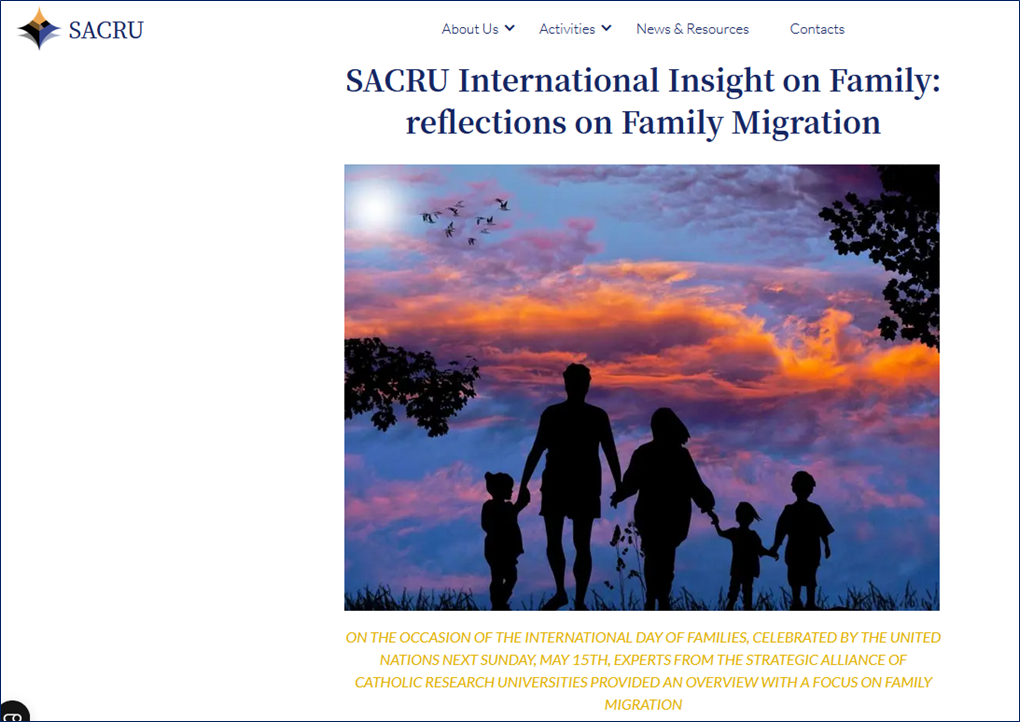【SACRU】 「見えざる手」を支える「見えざる心」
地球環境学研究科地球環境学専攻 平尾 桂子 教授
- 研究
ON THE OCCASION OF THE INTERNATIONAL DAY OF FAMILIES, CELEBRATED BY THE UNITED NATIONS NEXT SUNDAY, MAY 15TH, EXPERTS FROM THE STRATEGIC ALLIANCE OF CATHOLIC RESEARCH UNIVERSITIES PROVIDED AN OVERVIEW WITH A FOCUS ON FAMILY MIGRATION

「見えざる手」を支える「見えざる心」
本来「持続可能な発展」とは、私たち現世代がニーズを満たす際に将来世代の能力を損なわないようにしなくてはいけないという義務を意味しています。しかし、この「将来の世代」とは、いったいどこから来るのでしょうか。この単純な問いから、私たちが持続可能性を語る際に、いかに「社会における家族の役割」を見過ごしてきたかという盲点が見えてきます。個々人の人生における家族の重要度は低下したとよく言われますし、家族の定義も多様化しています。にもかかわらず、「家族」が子どもを生み出す唯一の制度であることに変わりはありません。しかも、社会に子どもを提供する役割を、親は無償で担っているのです。
社会はその成員が再生産されない限り持続可能ではありえません。このありふれた定理が、少子高齢化という世界のメガトレンドの先頭を走る日本において、深刻な社会問題となっています。日本の出生率は予想を上回る速度で低下しており、2021年の出生数速報値では、2028年に達すると予測されていた水準に前倒しで達するほどとなりました。その結果、現在1,799ある地方自治体のうち約896が、人口減少により2040年までに消滅する可能性があると指摘されています。この予測は、少子化(毎年の女児出生数の減少)や、教育・雇用機会が多い大都市部への女性の流出により、これらの自治体から出産適齢期の女性が失われているというデータに基づいています。
これらの問題への特効薬は今のところ見つかっていませんが、従来の研究から、ジェンダー平等を確保し、仕事と家庭の両立をはかることが解決の鍵を握っていると考えられます。家族が子育ての主体であるならば、母親がその無償労働の大半を担っている事実を認めなくてはなりません。若い男性の経済力が不安定になり、共働きが当たり前になっているにもかかわらず、男性が女性よりも家事・育児をする国はありません。世界の一般的な家族にとって、子どもはお金がかかる存在ですが、感情面ではお金に換えられない価値ある存在でもあるのです。将来の労働力を育み市場に提供する「見えざる心」の価値が、構造的に過小評価されている現実が問い直されねばなりません。
Invisible Heart for Invisible Hand
Keiko Hirao, Graduate School of Global Environment Studies, Sophia University (Japan)
The original concept of sustainable development refers to our obligation when meeting our needs that we should not compromise the ability of future generations. Nevertheless, where does this “future generation” come from? This simple question reveals the blind spot in sustainability discourse that we have ignored the crucial role of the family in society. Despite a popular notion that the family is losing importance in individual lives, and regardless of its definitions, the family still is the only institution generating children. More importantly, parents provide this service to a society free of charge.
Societies cannot be sustainable unless their population is regenerated. This mundane theorem has become a serious social concern in Japan which has been the front runner in the world megatrend of low fertility and aging population. The birthrate in Japan is falling faster than expected, and estimated birth in 2021 dropped to the level projected for 2028. Consequently, about 896 municipalities out of 1,799 will disappear by 2040 due to depopulation. This estimate is based on the data that these cities are losing women of reproductive ages either by low fertility (fewer girls born each year) or by women migrating to larger cities where there are more education and employment opportunities.
There is no panacea to this problem, but the literature suggests that the key is ensuring gender equality and solving the work-and-family conundrum. When we say families are the primary agent for childrearing, we should acknowledge that mothers are bearing the lion’s share of the unpaid work. The economic insecurity of young men has made dual-earner families a norm, yet there is no country where men spend longer hours in domestic work and childcare than women do. For many families in the world, children are economically worthless but emotionally priceless. We then must reexamine the systematic devaluation of the Invisible Heart that provides a future workforce to the market.
